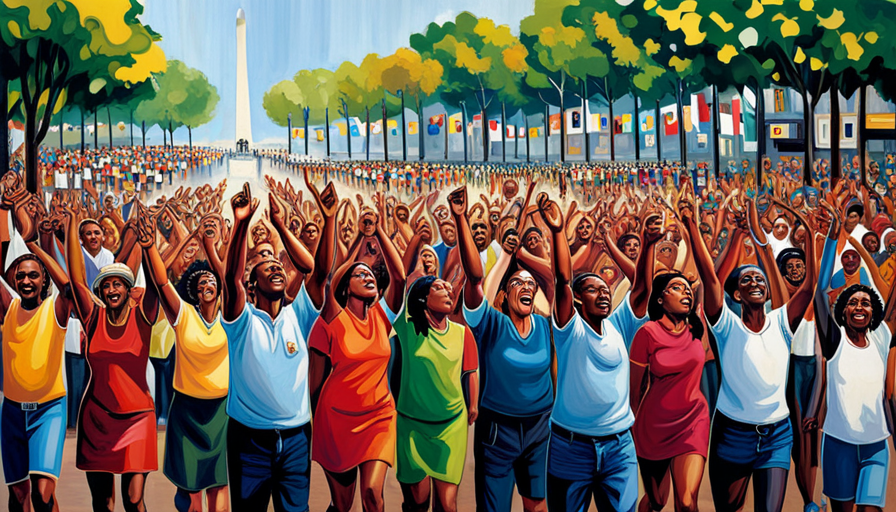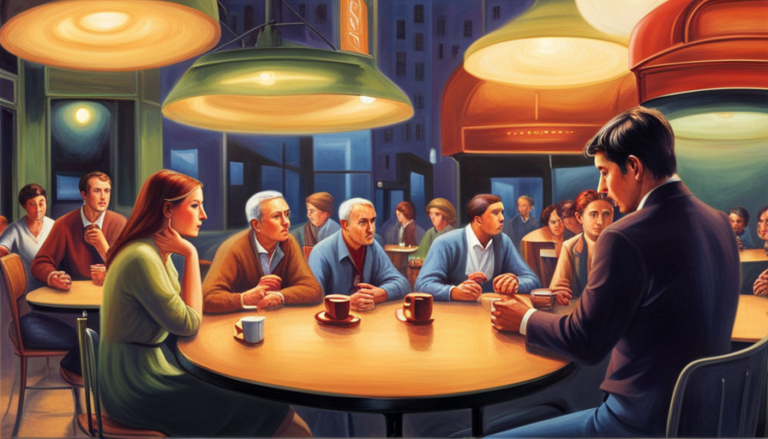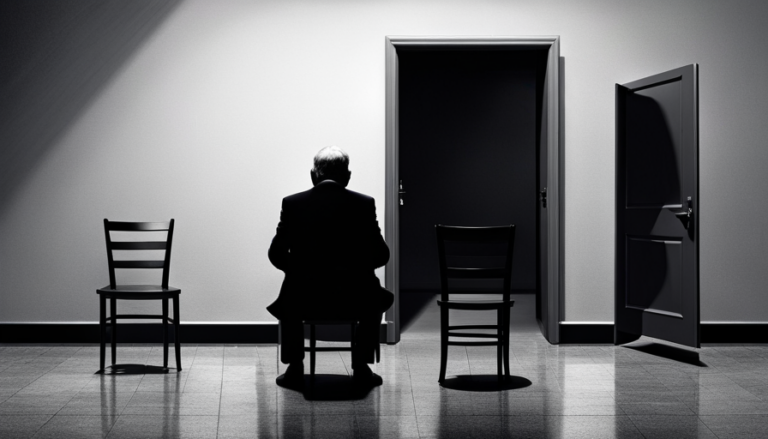How Did Martin Luther King Jr Inspire Others
Are you ready to be inspired by the extraordinary life and powerful influence of Martin Luther King Jr.? Prepare…

Are you ready to be inspired by the extraordinary life and powerful influence of Martin Luther King Jr.?
Prepare yourself for a journey into the remarkable achievements of this iconic civil rights leader. From his early years and influential upbringing to his pivotal role in the Montgomery Bus Boycott, King’s unwavering commitment to justice and equality will leave you in awe.
Through his famous speeches, nonviolent resistance, and philosophy of peaceful protest, he forever changed the course of history.
Join us as we delve into how Martin Luther King Jr.’s actions continue to inspire others today.
Key Takeaways
- Martin Luther King Jr.’s powerful speeches, such as the iconic ‘I Have a Dream’ speech, inspired millions and shaped American history by rallying people towards civil rights and motivating them to fight against racial discrimination.
- King’s philosophy of nonviolent resistance and peaceful protest, rooted in Christian teachings, rejected violence as a means of achieving social change. His approach of using peaceful methods like sit-ins, boycotts, and marches promoted love, understanding, and empathy, showing that change can be achieved without violence or aggression.
- The Montgomery Bus Boycott, which King organized after Rosa Parks’ arrest, lasted for 381 days and served as a catalyst for future civil rights movements. Utilizing nonviolent resistance, protesters carpooling or walking long distances, it showcased the effectiveness of peaceful activism.
- Martin Luther King Jr.’s legacy continues to have a significant impact. The establishment of Martin Luther King Jr. Day as a national holiday serves as a reminder of his efforts for racial equality and social justice. His influence extends to civil rights leaders and activists, who draw inspiration from his teachings and continue the ongoing fight for racial equality and social justice.
The Early Life and Influences of Martin Luther King Jr.

You’ll be inspired by learning about the early life and influences of Martin Luther King Jr.
Martin Luther King Jr.’s childhood experiences played a crucial role in shaping his beliefs and values. Growing up in Atlanta, Georgia, he witnessed firsthand the harsh realities of racial segregation and discrimination. These experiences fueled his passion for justice and equality from an early age.
Additionally, King’s early mentors had a profound influence on his beliefs. His father, Reverend Martin Luther King Sr., instilled in him a deep sense of faith and spirituality, while his mother, Alberta Williams King, taught him the importance of education and community service. The teachings of Mahatma Gandhi also greatly impacted young King and shaped his philosophy of nonviolent resistance.
With this strong foundation, it was only a matter of time before Martin Luther King Jr.’s leadership would rise to prominence during the Montgomery Bus Boycott.
SECOND SUBTOPIC: ‘The Montgomery Bus Boycott and the Rise of King’s Leadership’
The Montgomery Bus Boycott and the Rise of King’s Leadership
During the Montgomery Bus Boycott, King’s leadership rose to prominence and inspired countless individuals. As the leader of the civil rights movement, King organized a boycott of the city’s buses after Rosa Parks was arrested for refusing to give up her seat to a white passenger. This boycott lasted for 381 days and brought attention to the injustices faced by African Americans in segregated public transportation.
Under King’s guidance, the boycott utilized nonviolent resistance as a powerful tool for change. Protesters carpooled or walked long distances instead of taking buses, showing their determination and commitment to equality.
The success of the Montgomery Bus Boycott not only led to integration on Montgomery’s buses but also served as a catalyst for future civil rights movements across the country.
This pivotal moment in history set the stage for King’s famous speeches and their impact on American society.
King’s Famous Speeches and their Impact

King’s famous speeches, such as the iconic ‘I Have a Dream’ speech, continue to resonate with people and shape the course of American history. Through his exceptional public speaking skills, King was able to inspire millions and rally them towards the cause of civil rights.
His speeches were not only powerful in their message, but also in their delivery. With his commanding presence and passionate voice, he captivated audiences and ignited a fire within them to fight for justice and equality. King’s words had the power to move hearts and minds, making it impossible for people to ignore the injustices faced by African Americans.
These speeches served as a catalyst for change and motivated individuals from all walks of life to join the fight against racial discrimination.
Transitioning into the subsequent section about nonviolent resistance and King’s philosophy of peaceful protest…
Nonviolent Resistance and King’s Philosophy of Peaceful Protest
One of the key principles in King’s philosophy was the idea of nonviolent resistance, which he believed could bring about lasting change. He saw peaceful protest as a powerful tool for challenging injustice and inspiring others to take action. By advocating for nonviolence, King emphasized the importance of love, understanding, and empathy in the face of hatred and oppression. His belief in peaceful protest was deeply rooted in his Christian faith, which taught him to turn the other cheek and seek reconciliation rather than revenge. King’s commitment to nonviolent resistance inspired countless individuals to join the Civil Rights Movement and fight for equality. Through his words and actions, he showed that change could be achieved without resorting to violence or aggression.
| Nonviolent Resistance | Peaceful Protest |
|---|---|
| Rejects violence as a means of achieving social change | Uses peaceful methods such as sit-ins, boycotts, and marches |
| Promotes love, understanding, and empathy | Challenges injustice with dignity |
| Rooted in Christian teachings | Advocates for reconciliation rather than revenge |
King’s philosophy of nonviolence continues to have a profound impact on social movements around the world today. It serves as a reminder that lasting change can be achieved through peaceful means. As we delve into King’s legacy and continuing impact on society…
King’s Legacy and Continuing Impact
Martin Luther King Jr.’s legacy and continuing impact can be seen in the establishment of Martin Luther King Jr. Day, a national holiday that celebrates his life and achievements.
This day serves as a reminder of his tireless efforts to fight for racial equality and social justice.
Despite progress made over the years, the ongoing fight for racial equality and social justice is a testament to King’s lasting influence on society.
The establishment of Martin Luther King Jr. Day
The establishment of Martin Luther King Jr. Day has inspired others to recognize and honor his legacy. This national holiday, which takes place on the third Monday in January, holds great significance as it commemorates the life and achievements of Dr. King. It serves as a reminder of his tireless efforts in advancing civil rights and promoting equality for all individuals, regardless of their race or background.
By dedicating a day to celebrate Dr. King’s contributions, we not only acknowledge the impact he had on the civil rights movement but also encourage others to continue his work in their own communities. Many civil rights leaders have been influenced by Dr. King’s teachings and strategies, incorporating them into their own activism for racial equality and social justice.
As we reflect on Martin Luther King Jr.’s legacy through this national holiday, it is important to remember that the fight for racial equality and social justice is ongoing.
The ongoing fight for racial equality and social justice
Recognize and support the ongoing fight for racial equality and social justice as you reflect on the legacy of Martin Luther King Jr. His inspiring words and actions continue to resonate today, fueling a renewed commitment to address the deep-rooted issues of systemic racism in our society.
Activism against racial inequality has taken various forms, from peaceful protests to grassroots initiatives that aim to dismantle oppressive structures.
Ongoing activism seeks to challenge discriminatory practices that persist in many facets of life, including education, housing, employment, and criminal justice. It aims to create an inclusive society where every individual is treated with dignity and respect regardless of their race or ethnicity. This fight acknowledges that achieving true equality requires not just individual change but also systematic reforms.
Systemic racism continues to perpetuate disparities within our communities, impacting marginalized groups disproportionately. By supporting ongoing efforts for racial equality and social justice, we can honor Martin Luther King Jr.’s vision by actively working towards a more equitable future for all.
Conclusion
Congratulations on completing this thorough and research-driven exploration of Martin Luther King Jr.’s inspiring life and legacy. Throughout this article, we have delved into the early influences that shaped him. We have witnessed the rise of his leadership during the Montgomery Bus Boycott and experienced the profound impact of his famous speeches.
We have also examined his philosophy of nonviolent resistance and peaceful protest. As a result, it is clear that Martin Luther King Jr.’s enduring legacy continues to inspire others to fight for justice and equality. His words still resonate today, reminding us that ‘injustice anywhere is a threat to justice everywhere.’





